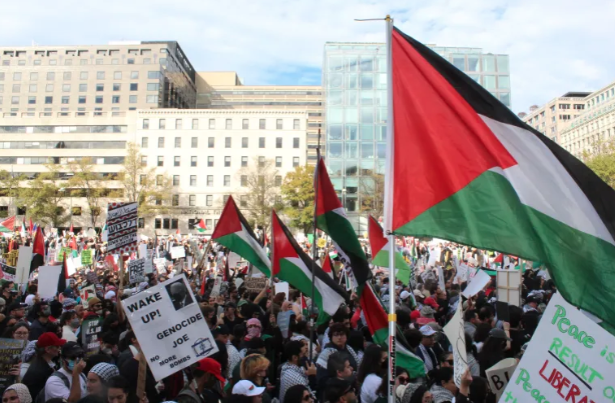Palestinian territories
DC Protests Decry Violence in Israel War

As the Israel war casts its long shadow over global consciences, the streets of Washington, DC, become the stage for a powerful tableau of protest. The American capital is awash with tens of thousands of demonstrators, their voices a clamorous tapestry against the somber backdrop of the Capitol’s domes. They stand united, a mosaic of diversity with placards held high, in a stark rebuke of what they label a ‘genocide’ in Gaza. Amidst these surging tides of human solidarity, President Joe Biden’s steadfast support for Israel is fervently called into question, challenging the political underpinnings of America’s foreign policy amidst the crescendo of the Israel war.
The historical threads of the Israeli-Palestinian conflict are densely woven and as intricate as any tapestry of human endeavor and sorrow. The recent convulsions in Gaza are but the latest in a series of confrontations that hark back to mid-century political upheavals and territorial claims and counterclaims. This centuries-old land, holy to so many, remains a crucible of religious and cultural tensions, a place where peace seems perennially on tomorrow’s horizon. The United States, a staunch ally of Israel since its establishment, now faces internal dissent as its policies are called into question by the very voices it champions as the bedrock of democracy.
In the shadow of Capitol Hill, the atmosphere was laden with the grief and fervor of a crowd come together in solidarity. Amid the swell of outcry and protest, a voice cut through, clear and impassioned. Her name was Nidaa, which in Arabic whispers of a call to action, a beckoning. She spoke, her voice tremulous yet fierce, of her family’s heartbreak in the crucible of Gaza, of homes and hopes crumbling under the relentless barrage of bombs. “Stop this genocide,” she demanded, her cry a confluence of the personal anguish etched into her history and the collective plea for a political reckoning.
Not far from her stood Huda Alkuraey, her presence an embodiment of the diaspora that Yemen has bled into the world, herself a testament to the pain that seeps through generations. She spoke with the weight of over seven decades of suffering shared by her people and Palestinians alike, a narrative of displacement and relentless strife.
And then there was David Horowitz, whose heritage traced back to the very heart of Jewish tradition. He stood as an ally, his words branding the ongoing strife an “abomination,” a stark testament to a dissent that crossed the boundaries of faith and ethnicity. In this gathering, the environment echoed a mosaic of stories, each voice a thread in the tapestry of resistance and resilience, painting a human condition too often abstracted into political debate. Each tale, an exploration of survival, of coping strategies born of necessity and a resourcefulness that the world often views, but rarely truly sees.
The throngs in Washington, their slogans and banners, are emblematic of a wider schism. There is a chafing at the long-standing narrative that has justified support for Israel as a bulwark of democracy in a volatile region. It is a narrative now contested on the streets, with the American public challenging the Biden administration’s diplomatic parlance that has allowed for continued military action. This fracture is indicative of a larger shift, suggesting a transformation in the way American engagement in Middle Eastern policy is perceived and critiqued by its citizenry.
The steadfast backing of Israel by the Biden administration, encapsulated in the substantial $14 billion aid request for the country, draws scrutiny. The chants of protestors, branding Biden with labels of complicity, reflect a moral conundrum for a nation priding itself as a beacon of human rights. One cannot help but question the congruity between the administration’s domestic stance against Islamophobia and its foreign policy that seems to disregard the plight of Muslim Palestinians.
In the shadow of America’s power, the echoes of the protesters’ chants rise, forming a stark counterpoint to the stoic marble of Washington’s edifices. Signs reading ‘Genocide Joe, you lost my vote’ and chants branding the President with accusations of genocide form a somber tapestry of discontent. From Freedom Plaza to the Capitol, the groundswell of frustration and solidarity with Palestinians transformed the city’s political landmarks into stages of public conscience.
As the voices in Washington rise and fall, the question they leave hanging in the air is heavy with historical weight and moral gravity. Can a government that espouses the values of democracy and human rights abroad be true to them at home while maintaining an alliance with actions considered by some of its citizens to be a betrayal of those very principles? This dichotomy lies at the heart of a deeply troubled policy, a conundrum that the Biden administration, and indeed, all future administrations, will need to navigate as they balance strategic interests with the calls for human dignity and peace. As the clamor for a ceasefire grows, it is clear that the repercussions of these policies and public reactions will resonate far beyond the steps of the Capitol, echoing in the annals of history and the ongoing struggle for peace in the Middle East.












You must be logged in to post a comment Login